All for Nothing? the rise and long fall of Steve Marriott
- jamesgeraghty
- Aug 16, 2025
- 21 min read
Stephen Marriott born in Essex in 1947, became one of the icons of the late 60’s mod scene - but has sadly (and wrongly) been somewhat forgotten in recent decades.
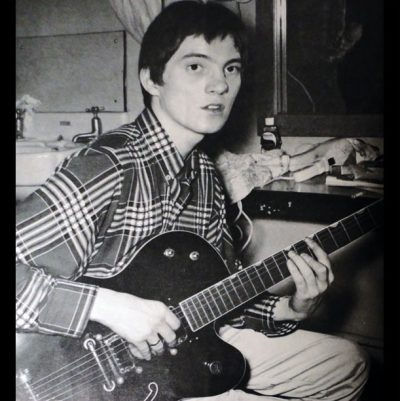
He was arguably the greatest white singer to come out of Britain in the 1960s, but had some massive bouts of bad luck, some poor choices, chronic addictions and the ability to pull the rug from under his own feet! A man who should be feted as one of the greats, seems to have been consigned to the smallprint of posterity. So, now it is time to look back at his life, his talent and of course, his issues and imagine what was, and might have been.
He was born in Plashet, a district of East Ham, London, in 1947. His father, Bill, was a printer and then later owned a jellied eel stall (Bill’s Eels) outside the Ruskin Arms Hotel (now closed). His mother, Kay, worked for Tate & Lyle sugar manufacturers in Silvertown (West Ham). Bill was a musical man, playing piano in local pubs and he brought young Steve a ukulele and harmonica, which Steve then taught himself to play.
From an early age, Marriott looked and acted like entertaining was in his blood and he would busk at bus stops for pocket money and also win talent contests when the family took their annual holiday to Jaywick Holiday Camp near Clacton.
Early Bands:
By the age of twelve, he was already in his first band, with school mates Nigel Chapin and Robin Andrews and calling themselves The Wheels, who then became the Coronation Kids and lastly, the Mississippi Five (adding Simon Simkins and Vic Dixon to the line-up). Buddy Holly was his early hero and he made efforts to mimic him, even wearing large-rimmed glasses (with lenses removed).
It was in this era that he penned his first tune, Sheila My Dear, about his aunt (Sheila), with whom he had a close relationship. As they built up their skills, they started to get gigs in coffee bars around East Ham and also Saturday morning shows at the Essoldo Cinema in Manor Park. Marriott was already developing a reputation as being something of a cheeky child, something that would hang around him through his life, and he was always seemingly involved in pranks and practical jokes, although he did have to make a strong denial that he started a fire in a classroom at Sandringham Secondary Modern School.
In 1960, Marriott’s father saw that the musical Oliver!, being produced by Lionel Bart, was looking for a new Artful Dodger, for a run at the New Theatre (now the Noel Coward Theatre) in the prestigious West End. He encouraged his son to apply and he duly got an audition, at which he sang Who’s Sorry Now (Connie Francis) and Oh, Boy (Buddy Holly), which was enough to impress Bart, and he was hired. He would stay with the show for 12 months, moving through several roles on the production and eventually getting paid the princely amount of £8 per week (around £160 in 2025 value).
This was also Marriott’s first opportunity to appear on vinyl, as he was picked to sing several Artful Dodger songs - Consider Yourself, Be Back Soon and I’d Do Anything - for the official stage show album, recorded at the illustrious Abbey Road Studios and released on the World Record Club.
Steve Marriott: Consider Yourself (audio only - a very young Steve singing)
Acting Dream?
This success on the London stage, led to his parents pushing him towards acting and managing to get him enrolled into the Italia Conti Academy. They couldn’t afford the school fees, so it was agreed that those would get deducted from any paid work the school found him. That cheeky persona came to the fore again, as he was effectively typecast as a lively Cockney in any work he won. There was the 1963 Peter Sellers film Heavens Above!, and a role as a drummer in Be My Guest. It was perhaps this latter role that reminded him again how much he loved music, and to his parents' annoyance, before he had completed his studies, he had already decided to give up acting. This actually caused enough grief with his parents that he had to leave home and stay with friends for a while.
In fact, he had already been touting his song Imaginary Love around the labels in 1963, eventually getting a deal with Decca Records, although it was the Kenny Lynch penned Give Her My Regards that became his first release (with Imaginary Love on the B-Side). It was not a commercial success, but he tried again with his new band, The Frantiks, and their cover of Cliff Richard’s early rock n roll hit, Move It, even involving former Shadows drummer Tony Meehan as producer. It was never released.
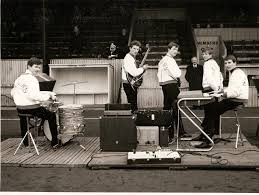
The Frantiks became Marriott and his Moments and got some themselves some decent support slots with the likes of The Nashville Teens, Georgie Fame and John Mayall. They were then persuaded to try doing a version of The Kinks recent hit, You Really Got Me for the US market, which didn’t garner any attention and he was dropped from the band, with the others feeling he was too young to be a successful lead singer.
That firing led to him having a brief spell with The Checkpoints in 1965. During their practices on the Old Kent Road, bandmate Chris Clements recalls that, “When we rehearsed with him, he almost spoke the words of the song, rather than sang the words. He was listening to us, making sure we got the backing right, so he didn’t put himself out vocally, But when we did the first gig with him, out came this fantastic soul voice, we all looked at each other, and our mouths fell open!”
All the Small Faces:
Marriott first met Ronnie Lane and Kenney Jones in July 1964 at a gig at The Albion in Rainham, as they were appearing with their various bands. After his ejection from The Moments, Marriott found himself a job at the J60 Music Bar in Manor Park. One day while at work, Lane came in looking for a new bass and later that day they went back to listen to Marriott’s collection of imported R&B records - they were soon firm friends.
He was soon invited to join Lane and Jones in their band The Outcasts for their regular show at the Earl of Derby in Bermondsey. They turned up drunk at a show, and Marriott destroyed the pub’s piano , which the trio found most amusing, the landlord less so, and they were sacked from that gig, effectively ending the band.
Marriott was also friends with a young David Bowie, and there was apparently some discussion around that time that they would form an R&B duo called David and Goliath. But the world was denied that interesting possibility, as Marriott, Lane and Jones decided to stick together, bringing in Steve's acquaintance Jimmy Winston (who switched from guitar to organ for his new band). His friend from Italia Conti, Annabel, came up with a name for the new band, as she felt they all had ‘small faces’. Also, to give extra resonance to the choice, everyone except for Winston was under 5’6”, so quite small, and ‘face’ in mod culture also was a term of respect for a well known mod.
Their early sets would include plenty of classic R&B and soul classics, including Please, Please, Please by James Brown, You’ve Really Got A Hold Of Me by Smokey Robinson and Stand By Me by Ben E. King. There were also a few Marriott / Lane compositions like Come On Children in the setlist- and Marriott was tuning his fantastic vocal ability to the styles of his heroes like Otis Redding and Bobby Bland.
They got their first gig outside London at a working men’s club in Sheffield, which didn’t go down so well. It was full of Teddy boys and workers who didn’t like what they heard and so the band were paid off after just three songs. They walked along to the moddish King Mojo Club, owned by Peter Stringfellow, and offered to play for free. Their set there went down much better, leaving those locals wanting more. They also got themselves a residency at the Cavern Club in Leicester Square where they were supported by a young Sonny & Cher, who were living in London at the time.
Small Faces: What'cha Gonna Do About It? (Live on Beat Club, 1966)
What You Going To Do?
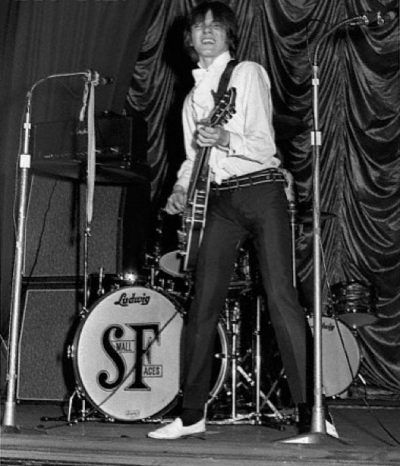
They were signed by Don Arden (manager of a diverse range of acts, from Jerry Lee Lewis to ELO and Black Sabbath) in just six weeks and got their first single, Whatcha Gonna Do About It? out and into the UK charts. They were getting paid a regular wage by Arden, of a princely £20 per week (about £340 today), along with accounts at some clothing stores on Carnaby Street. He also got them all living in the same house, on Westmoreland Terrace in Pimlico, which they moved into on Boxing Day 1965.
Another tune they were regularly playing at that time, was a version of Willie Dixon’s classic blues track You Need Lovin’. Robert Plant, who was a fan of theirs, and a regular at their gigs, would later take their version and it would morph into Led Zeppelin’s Whole Lotta Love. Marriott seemed to hold no malice for this appropriation though.
Small Faces: Sha-La-La-Lee (Live on Beat Club, 1966)
Winston left the band and was replaced by Ian McLagan, who played his first gig with them in November 1965. They were back in the charts with their third single, Sha-La-La-La-Leee, written for them by Mort Shuman (who interestingly wrote Viva Las Vegas amongst others, for Elvis). Their debut album Small Faces followed in May 1966 and was an instant success. They were now truly well into the big time in the UK and getting regular appearances on shows like Ready Steady Go! and Top Of The Pops.
They perhaps hit their commercial peak in August that year, when All Or Nothing (which incidentally, I happen to think is about the best song of the whole decade) got to number one in the UK. Kay Marriott (Steve’s mum) said it was written about his break up with his fiance at the time, Susan Oliver.
They were due to do a big tour of the US, along with the Lovin’ Spoonful and the Mamas & the Papas, but Arden canned it when it was revealed that McLagan had recently been convicted for a drugs offence.
The Arden relationship would last until 1967, when an argument around unpaid royalties led him to sell them on to Andrew Loog Oldham, the maverick owner of Immediate Records and manager of the Rolling Stones. This period was particularly galling for them, given that in 1966 they had been one of the highest grossing live acts in the country and had had four Top 10 hits, yet still had virtually no money to show for it.
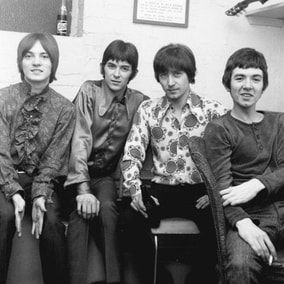
More immediate success and happy Stan
Here Comes The Nice was the first single of this new deal, and somehow escaped censorship, with it being a clear reference to their drug use and the person who sold them their drugs. Confusingly, another eponymously titled album soon followed, which wasn’t a massive seller but was well received by other musicians. They did also manage to make a breakthrough in the States in 1967, as Itchycoo Park broke the Top 20 there (finally peaking in early 1968).
Marriott, at this time, was smitten with the model Jenny Rylance from when they first met in 1966. Sadly for him, she was dating the up and coming singer Rod Stewart, but became friendly with him, and when she and Rod split up they had a brief relationship. She went back to Stewart again, before that relationship ultimately ended for good, leaving Marriott to pursue her once more, writing the song Tin Soldier about her.
Small Faces: Tin Soldier ('Live' on French tv, with PP Arnold - you should really be getting the idea of how good his voice was on this)
It continued to be a good period for the band, and for Marriott. Tin Solder became a decent hit for them in the UK at the tail end of 1967, while Steve and Jenny were married at Kensington Registry Office in May 1968. They moved into a house in Moreton, Essex (Beehive Cottage), where he would eventually set up his own studio called Clear Sounds.
The album generally considered to be their career masterpiece, Ogdens’ Nut Gone Flake, also came out in May 1968. It spent an impressive six weeks at number one in the UK, but only stumbled to number 159 in the US. There are six original songs on side one, and a psychedelic fairy tale on side two about the adventures of ‘Happiness Stan’ who was trying to find out where the other half of the moon went when it waned and was narrated by comic actor Stanley Unwin. The problem was, its complexity meant it would be all but impossible to take out and play live - it got just one live outing, with the whole thing being played live on BBC show Colour Me Pop.
Lazy Sunday was released as the first single from the album, against the bands wishes, with its somewhat cheeky chappy cockney style and lyrics about Marriott arguing with his neighbours. It had been recorded as something of a joke, but nonetheless, reached number two in the UK.
Frampton
Ogden’s Nut Gone Flake had been successful, reaching number one, but Marriott thought they were getting creatively stale. He tried to bring in Peter Frampton to augment his guitar playing, but the other three refused the move. He was drifting away though, spending more time with Frampton and Greg Ridley. Rumours began to swirl around that the band was done, but they consistently denied it. But when Marriott stormed off stage during a show on New Year’s Eve 1968 shouting “I quit”, it was indeed all over.
The last album, the double LP The Autumn Stone, came out in 1969 after the band had split. Lane, Jones and McLagan would continue on together, joined by Rod Stewart and Ronnie Wood, who had both just left the Jeff Beck Group, and formed the Faces.
Kenney Jones would later reflect on this turbulent period, in a 2001 interview with John Hellier, “I wish we had been a little bit more grown up at the time. If we had have played Ogden’s live, it would have boosted our confidence so much. We were labelled as a pop band, which definitely got up Steve’s nose more than we realised. I wish we had been more like The Who in the fact that when they have problems, they stick together until they’ve overcome them. Steve just thought, well, how do we top Ogden’s and he was off. Ogden’s was a masterpiece if we had played it live, we would have gone to even greater things. I reckon we were on the verge of crossing the great divide and becoming a heavier band.”
Have Some Humble Pie
While the others had become the Faces, early 1969 saw the formation of Humble Pie with Frampton, Jerry Shirley on drums and Greg Ridley on bass. Marriott came in as the vocalist and was given a level of artistic freedom he always felt was restricted in the Small Faces.
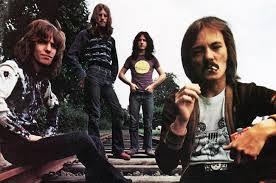
This new band made the most of his Clear Sounds studio to rehearse and were soon ready to release both their debut album, As Safe As Yesterday Is, and a first single, Natural Born Bugie (with an intentional misspelling).
Humble Pie: Natural Born Bugie (Live on Beat Club, 1969)
It was almost over before it had really begun. Returning from an American tour, they discovered that Immediate had gone bust and so they had to seek out a new label and manager. They wound up on A&M and now with Dee Anthony as the new manager, who felt they needed to get a louder sound.
They toured relentlessly - and embarked on an incredible nineteen US tours in just three years! That, and all the other touring did pay dividends though, as the next two records, Humble Pie and Rock On both did well commercially as a result. It was again Marriott’s incredible vocals that were drawing attention, but Anthony’s attempt to make him take more of the spotlight eventually edged Frampton away.
Humble Pie: Black Coffee (Live on Old Grey Whistle Test, 1973)
Frampton later admitted though, “it was the best band you could ever be in as far as I was concerned, because you’ve got my idol there. Steve would open his mouth and gold came out.”
Personality Crisis
The excessive touring, not to mention excessive use of alcohol and drugs, were taking their toll on Marriott though. He had taken amphetamines (speed) and cannabis for quite a while, even occasionally venturing into LSD with the Small Faces, but the regular touring with Humble Pie helped him develop a horrific cocaine and alcohol addiction.
His wife Jenny would later say, “He became another person to cope with the pressures, he would say things like, ‘Please tell me that you’ll leave me if I go on tour again because if you say that I’ll have justification not to go, if I go and to be that other person again I’ll just go mad.’ This would be said in a moment of truth but the next day had changed his mind and he’d be up and off…. All sorts of chemicals were presented to him and he became addicted to them in the end. It was the drugs that destroyed our relationship. Before the home studio was built Beehive Cottage was our sanctuary, afterwards it just became his workplace.”
Jenny left him in 1973. He was also becoming just about impossible to work with in the band too. Humble Pie would be finished by 1975, citing of course, ‘musical differences.’ And there were again, more accusations of misappropriation - Marriott believed that Anthony had been diverting earnings into a new project with the departed Frampton. Later, his second wife, Pam Stephens, said that while Marriott was making his first solo album, they had been warned about accusing Anthony of anything untoward, and even received threatening phone calls as a result. Those allegations could have ended up most unfortunately for Marriott and his family. Anthony was apparently linked to the notorious Genovese crime family, and Marriott and Stephens were summoned to a meeting at the Revenite Social Club in Little Italy, where the likes of John Gotti, Frank Locascio and Paul Castellano were also present (all members of the Gambino crime family). He was supposedly told quite bluntly that there would be no money for him and that he needed to drop the matter - he did.
Going Solo
When Mick Taylor left the Rolling Stones in 1975 (he had come in during 1969 to replace Brian Jones), Marriott was in the running for that job but Mick Jagger blocked this possibility though, as he had apparently been upstaged by Marriott during the audition process. Ronnie Wood recalled that he would have been Keith Richards first choice though - “there was no way that once Steve opened his mouth Mick would have him in the band. He knew Steve would never stay in the background.”
Steve Marriott was back in Britain in 1976 as his debut solo release, Marriott came out. His first son, Toby was also born that March, and he and Pamela finally got married the following March at Chelsea Register Office.
Steve Marriott: Midnight Rollin' (Audio only)
His money was running out again, and so he formed a new band, the Steve Marriott Allstars, with Ridley, Ian Wallace on drums (King Crimson) and Mickey Finn on guitar.
More Small Faces
By 1976, the former members of the Small Faces were still owed money by Arden - £12,000 according to a court ruling. Arden agreed to make it up in monthly installments, but after just one payment he disappeared again.
However, Itchycoo Park and Lazy Sunday had been re-released in the mid-70’s, and this was enough to persuade McLagan, Jones and Marriott to get the band back together. Lane managed to attend two rehearsals before pulling out, to be replaced by Rick Wills (Roxy Music). What they didn’t know at that time was that Lane now had Multiple Sclerosis.
Small Faces: Lazy Sunday (On Beat Club - although this was a bit of a novelty tune, at 1:49 he opens up his voice and it suddenly sounds fantastic)
They managed two more albums though - Playmates (1977) and 78 In The Shade (1978) - both of which were not received well, critically or commercially. They quit again, with any money that Marriott might have made being used to pay off other old contracts. Money remained an issue and he had to sell his beloved Beehive Cottage and move into a small terrace in Golders Green.
Small Faces: Lookin' For A Love (Audio only - cover of a song by the Valentino's)
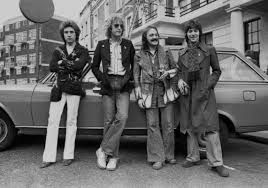
It seemingly never ended. 1978 also saw the Inland Revenue accuse him of owing £100,000 in tax from the Humble Pie era, something he assumed that Dee Anthony had taken care of. His current manager told him to get out of the country, and so he, Pam and young son Toby moved to stay with friends in California.
He tried forming another band, The Firm, with Leslie West and Jim Leverton, but this didn’t last long. He was so broke, he was allegedly down to trading in empty bottles for change. This meant that when a lucrative offer to reform Humble Pie came his way, it was not something he could turn down.
1980 saw Marriott and Shirley back together, recording a new song, Fool For A Pretty Face. There was no Frampton, but they were joined by respected bassist Anthony Jones and Bobby Tench, who had been in the Jeff Beck Group. It all kind of came together, with a contract earned with Atco - although in the UK, any records would be distributed by Jet Records, owned by none other than former nemesis, Don Arden…
On To Victory was something of a hard rock album and was followed in 1981 by Go For The Throat. Both of the LPs did relatively well and they got a decent tour of the US out of it, as becoming part of the Rock N Roll Marathon bill (with Ted Nugent and Aerosmith).
Good things never seemed to last long for Marriott though…
Towards the end of 1981, his marriage was failing, he broke his wrist in an accident and had a suspected burst ulcer whilst the band was opening for Judas Priest. Humble Pie mark two was done.
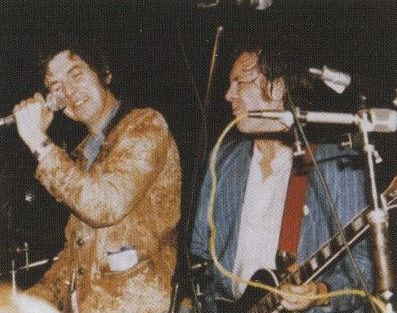
He wanted to catch up with Lane, whose condition by now was starting to get worse. Marriott suggested that they try and gig together again - and hooked up with Jim Leverton, Mick Weaver, Dave Hynes, Zoot Money and Mel Collins, recording an album called Majik Mijits. Sadly, because of Lane’s illness, they could not properly tour the album and so Marriott decided not to release it (it finally came out in 2000). He returned to playing clubs in New York again for a bit. Then he went off with Leverton, Goldy McJohn and Fallon Williams and toured non-stop for eighteen months, mostly playing Small Faces and Humble Pie material.
His personal life was in turmoil again. His marriage to Stephens was definitely over, especially once she found out that he was expecting another child with a Canadian called Terry Elias. Back in the UK with no wife, no house and no money, he stayed for a while with his sister Kay.
He played the pub circuit, being paid in cash as the Inland Revenue were still chasing him for those back taxes. He developed a relationship with his old friend Manon Piercey, which resulted in another child, a daughter called Mollie Mae. Piercey helped him reduce his reliance on drink and drugs and he would often go weeks and months without touching them. His new band, Packet Of Three, were touring a lot around North America and Europe, throughout 1985.
Relationship-wise, he moved on again, leaving Piercey for Toni Poulton, who he had met at one of his gigs, and they rented a cottage together in Arkesden in Essex.
Because he was suspicious and resentful about the music business and the issues of being famous, he turned down several lucrative record and touring deals, something the rest of the band resented. He was, the others felt, holding them back and so Packet Of Three was over.
The late 80’s were a mixed bag for him, turning down an offer from Andrew Lloyd Webber to record some songs for Evita because he was drunk; recording a version of Shakin’ All Over for a low budget horror movie, because it was easy money; and then he got himself a deal with Trax for another solo record - with 30 Seconds To Midnite, which funded his purchase of a narrowboat; and to round it off, he married Poulton in Epping in July 1989.
More Pie?
Pete Frampton was back in the UK during 1990, at which point Marriott was playing a staggering 200 gigs a year, and suggested they reform Humble Pie. The idea was to make a one-off album and tour it, which would make Marriott’s life more financially comfortable. But, despite going to Frampton’s LA studio to start proceedings, he changed his mind and flew home, the project incomplete. Two of the songs from those sessions, The Bigger They Come and I Won’t Let You Down, did appear on Frampton’s Shine On: A Collection. Another song with the pair on, Out Of The Blue, was put out by Frampton after Marriott’s death.
Peter Frampton: I Won't Let You Down (Audio only - with Marriott on vocals)
The End
Returning from the incomplete sessions at Frampton’s studio, Steve and Toni came home on 19 April 1991. Poulton said he was drinking heavily on the plane, and not in a good mood, with the pair arguing the whole way. Once back in the UK they managed to meet up with a friend and head out for dinner on their arrival. They were at The Straw Hat in Sawbridgeworth, drinking more before heading back to their friends house. They argued at bedtime and Poulton awoke to find that he had taken a taxi back to their cottage in Arkesden.
Early in the morning of the 20th, a passing driver saw the roof of Marriott's cottage on fire and called 999. At least four engines attended the scene and they battled their way inside. Assistant Divisional Fire Officer Keith Dunatis recalled, “We searched the bedroom areas and it was very hot, we knew immediately that no one could have survived the fire. We began to feel around the walls and discovered him lying on the floor between the bed and the wall. I would say he had been in bed and tried to escape.” It was presumed that in a drunken state, he had fallen into a deep sleep whilst smoking a cigarette. His death was recorded as ‘accidental death by smoke inhalation.’
What legacy does he leave?
It is fair to say that Marriott had something of a messy life - some through bad luck, some from his larger than life and often contradictory personality, and definitely some from poor choices. But he was a decent guitarist, an accomplished songwriter, and oh.... that voice!
His old friend Jerry Shirley noted, “He’s never got the credit he deserves. He should be in the Rock & Roll Hall of Fame because he was the greatest white soul singer that England ever produced. I’m certain that if you caught the likes of Rod Stewart and Paul Rodgers in a private moment and asked them who was the main man, they would say Steve Marriott.”
Attendees at his funeral included, Kenney Jones, Peter Frampton, R&B legend P.P. Arnold (who had sung backing vocals on several of his songs), the actor Terence Stamp, and with wreaths coming from the likes of Dave Gilmour and Rod Stewart.
A concert marking ten years since his death at the London Astoria (April 2001) saw a band of Humble Pie alumni - Peter Frampton, Clem Clempson, Greg Ridley and Jerry Shirley - with guest appearances from Small Faces' Kenney Jones and Ian McLagan, as well as Paul Weller, Noel Gallagher and Bobby Tench. Money from the concert and resultant DVD were donated to The Small Faces Charitable Trust, set up by Jones in memory of Marriott and Lane (who had succumbed to MS in 1997).
Far Out magazine would later say that the success of The Beatles and The Stones actually ended up masking some of the success in the US of other British invasion bands like The Who, The Kinks, The Zombies and Small Faces - and that, “Of the groups listed… Small Faces is the name we seem to hear least these days, but their contributions to the rock n roll drive of the ‘60s were vital and immensely enjoyable."
Ian McLagan would note that, “Though he could be hell to be around, he had a pure heart and I loved as a brother.” Fellow Small Face Kenney Jones said of him that he was, “Such a small guy had the most powerful and soulful voice I’ve ever heard.”
Mojo magazine called him, “A transcendent white soul voice and superlative musicianship and songwriting.” Paul Stanley of Kiss was someone who got what was magical about him early on - “He had a great voice. Steve Marriott was unbelievable. He was one of my heroes. I saw Marriott perform live with Humble Pie and it was like being at a church revival.”
Both Robert Plant and Paul Weller have admitted that he influenced their vocal stylings to some extent. The Small Faces blues-rock, psychedelia and moddishness played no small part in influencing the BritPop of the 1990’s, with Noel Gallagher among those who were influenced and indebted to him.
Paul Weller felt that he was, “The best rock vocalist and front man of a band there ever was and ever will be," and Robert Plant humbly said in a 1977 interview, “I could never be compared with Steve Marriott because he’s too good, unfortunately! He’s got the best white voice, for sheer bravado and balls.”
As alluded to before, there were constant references throughout his musical career to the contradictions that perhaps led in part to his demise - self-sabotage, loathing of managers (several of whom had screwed the bands for royalties etc.) and whether he wanted to be a big front man or not (tours he turned down, like supporting Hendrix in the US in 1969).
We'll leave the last summation of him to the man who worked with on and off for more than two decades and who was well placed to describe his impact and his anomalies - Peter Frampton.
“In the studio, it was a great band with great material, and we played great together and we made great records, but as soon as we stepped on to the stage it was like the gloves came off. I often explain it to people that if you listen to a Who record and then go see the Who live, it’s like two different bands. That’s how Humble Pie worked, We were definitely a lot more ferocious live because of the energy that the entire population of us had.”
“There’s not enough words to say how big of a fan, and what a thrill it was, to be in a band with Steve. Yeah, it’s documented that we had our brotherly ups and downs, but that’s what makes for a great band.”
An unaddressed letter written by Steve in Santa Monica in March 1991 was later discovered: “I always had my doubts about living a pressurised lifestyle for money again. Now I know I don’t want or need it.” Frampton's response to that was - “Yes! So the smoking gun! A button he could press at any time to dislodge everything.”
“He had an awesome amount of unique talent and I have a very warm heart for Steve even though we had tough times, fought like brothers. One of the most important people in my life.” More recently, in a message on X (Twitter) in 2023, he said, “Steve Marriott was a force to be reckoned with! His singing was the male version of Mavis Staples! Ha ate & slept her voice. Listen to Oh La De Da by Mavis then Humble Pie’s. Both are scary good! I’ll always miss Steve.”
To end - perhaps my favourite song of the 1960's.....

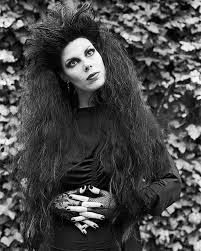

Comments